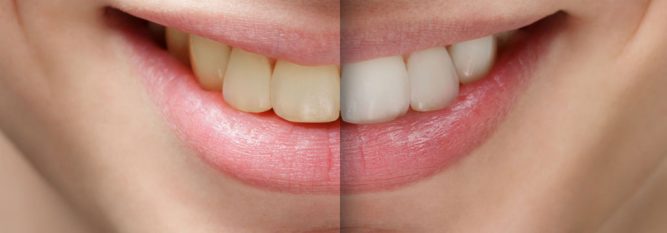There are so many tooth-whitening products available at chemists and supermarkets. So people are often curious about the difference between doing it yourself and getting your teeth whitened at the dentist’s office.
The difference is all about the strength of the whitening agent and safety.
Dentists apply a fairly high-concentration hydrogen peroxide gel to your teeth to whiten them, combined with a special ultraviolet light to accelerate the process and whiten the teeth more quickly. We have to put a protective barrier on the gums and the lips because without it you could get sunburnt.
The tooth-whitening process
We usually book people in for one and a half to two hours. After an initial treatment cycle of about 12 minutes, when the gel is used up, we check the colour of the teeth. Then we apply more gel and activate with the light again for another 12 minutes.
We might do up to four cycles depending on the desired whiteness.
Most people are very happy with the result. In order to sustain it, it’s best to also do follow-up whitening at home. So I recommend getting a take-home kit when you have your treatment at the dentist’s. Take-home kits tend to use carbamide peroxide instead of hydrogen peroxide, which is a bit stronger. You can use carbamide at night.
Natural whites
Everyone has their own natural teeth colour, in the same way that you have your own skin or hair colour. Once you change that colour by bleaching it, it will gradually return to its natural colour. This is why it is necessary to repeat the process, or at least top it up regularly, and the best way to do this is at home.
Depending on your diet—and most particularly on what you drink—you will need to bleach your teeth at home from anything between six to 12 months after the initial treatment by your dentist. Someone who drinks black coffee or red wine or any deeply coloured drinks regularly will notice that the relapse rate is a lot faster than someone who doesn’t. So they will have to do home-bleaching more regularly for the best result.
The gels that you buy at the chemist will most likely be less concentrated than what is in a take-home kit from your dentist.
Dangers of supermarket whitening kits
One thing I would warn people to be careful about is the so-called whitening toothpastes from the supermarket. These often contain quite abrasive particles which can actually scratch the teeth quite a lot. You’ll have the sensation of whitening but unfortunately it can lead to more staining afterwards.



